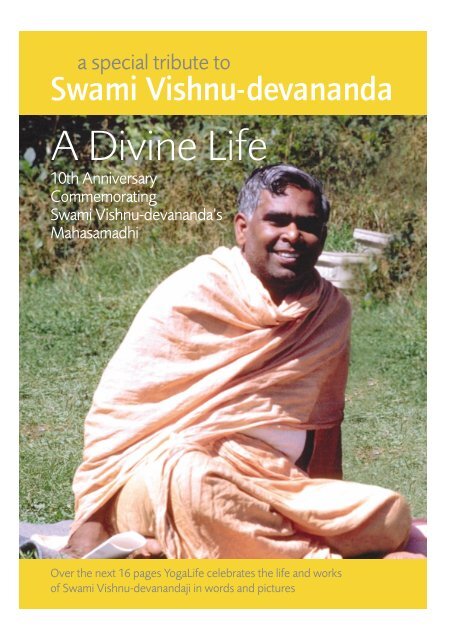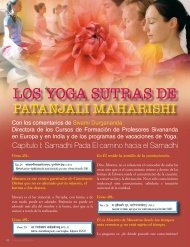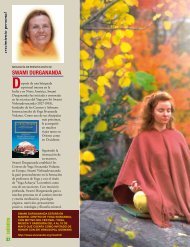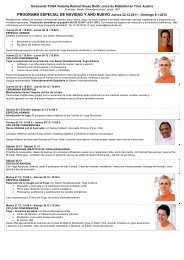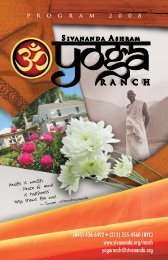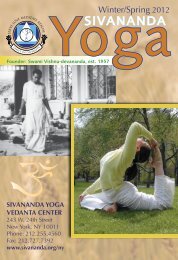A Divine Life - Swami Vishnu-devananda - Sivananda Yoga
A Divine Life - Swami Vishnu-devananda - Sivananda Yoga
A Divine Life - Swami Vishnu-devananda - Sivananda Yoga
Create successful ePaper yourself
Turn your PDF publications into a flip-book with our unique Google optimized e-Paper software.
a special tribute to<br />
<strong>Swami</strong> <strong>Vishnu</strong>-<strong>devananda</strong><br />
A <strong>Divine</strong> <strong>Life</strong><br />
10th Anniversary<br />
Commemorating<br />
<strong>Swami</strong> <strong>Vishnu</strong>-<strong>devananda</strong>’s<br />
Mahasamadhi<br />
Over the next 16 pages <strong>Yoga</strong><strong>Life</strong> celebrates the life and works<br />
of <strong>Swami</strong> <strong>Vishnu</strong>-<strong>devananda</strong>ji in words and pictures<br />
Autumn 2003 29
<strong>Swami</strong> <strong>Vishnu</strong>-<strong>devananda</strong> – A <strong>Divine</strong> <strong>Life</strong><br />
Below: <strong>Swami</strong><br />
<strong>Vishnu</strong>-<strong>devananda</strong><br />
– the yoga teacher<br />
30<br />
<strong>Swami</strong><br />
<strong>Vishnu</strong>-<strong>devananda</strong><br />
A short biography<br />
I<br />
Autumn 2003<br />
n 1957 <strong>Swami</strong> <strong>Vishnu</strong>-<strong>devananda</strong> set out from the<br />
foothills of the Himalayas to carry out the bidding<br />
of his teacher <strong>Swami</strong> <strong>Sivananda</strong>. His instructions<br />
were to spread the teachings of yoga in the West.<br />
For 37 years, he worked tirelessly as an active and<br />
dedicated spiritual teacher travelling around the<br />
world establishing city centres and ashrams where<br />
his work could be accomplished.<br />
<strong>Swami</strong> <strong>Vishnu</strong>-<strong>devananda</strong> was born in the south<br />
Indian state of Kerala on December 31, 1927. After<br />
completing school he entered the Engineering Corps<br />
of the Indian Army. It was while he was in the army<br />
that he first met <strong>Swami</strong> <strong>Sivananda</strong>, one of the great<br />
saints of modern times. After being discharged from<br />
the army, Swamy Kuttan Nair, as he was then known,<br />
was a schoolteacher in his native Kerala for a short<br />
while, before leaving his life behind and entering the<br />
<strong>Sivananda</strong> Ashram in Rishikesh in 1947. Within a<br />
year, he had embraced the order of sannyas with the<br />
name of <strong>Swami</strong> <strong>Vishnu</strong>-<strong>devananda</strong>.<br />
Remaining at the Ashram for ten years, he was<br />
appointed as the first Professor of Hatha <strong>Yoga</strong> at the<br />
<strong>Yoga</strong> Vedanta Forest Academy. He held a number of<br />
other positions at the Ashram, including personal<br />
secretary to <strong>Swami</strong> <strong>Sivananda</strong>.<br />
Upon leaving India for the West, <strong>Swami</strong> <strong>Vishnu</strong><strong>devananda</strong><br />
spent a year travelling, arriving on the<br />
West Coast of America in 1957.<br />
It soon became apparent that Westerners were<br />
so caught up in the whirlwind of their lives that they<br />
neither knew how to relax nor how to live healthy<br />
lives. <strong>Swami</strong> <strong>Vishnu</strong>-<strong>devananda</strong> devised the concept<br />
of the <strong>Yoga</strong> Vacation and set about creating places<br />
where people could have a complete rest of body,<br />
‘It soon became apparent that<br />
Westerners were so caught up in<br />
the whirlwind of their lives that<br />
they neither knew how to relax<br />
nor how to live healthy lives’<br />
mind and spirit. Several ashrams and city centres were<br />
founded based on an integrated approach to yoga.<br />
In 1969 the True World Order was established to<br />
create unity and understanding between peoples of<br />
the world. A unique <strong>Yoga</strong> Teachers’ Training Course<br />
was developed with the aim of bringing harmony in<br />
the world by teaching the basics of yoga discipline.<br />
In 1971 <strong>Swami</strong> <strong>Vishnu</strong>-<strong>devananda</strong> made headlines<br />
by flying around the world in his small two-seater<br />
plane dropping flowers and leaflets of peace over<br />
trouble spots of the world. He sponsored numerous<br />
festivals, conferences, symposiums and world toursall<br />
calling for peace and understanding.<br />
In addition to being a tireless worker for world<br />
peace and inspiring teacher, <strong>Swami</strong> <strong>Vishnu</strong><strong>devananda</strong><br />
is well known for his books The Complete<br />
Illustrated Book of <strong>Yoga</strong> and Meditation and Mantras.<br />
<strong>Swami</strong> <strong>Vishnu</strong>-<strong>devananda</strong> left his body on<br />
November 9, 1993 leaving behind him a worldwide<br />
organisation dedicated to propagating the ancient<br />
and timeless wisdom of yoga.<br />
<strong>Swami</strong> <strong>Vishnu</strong>-<strong>devananda</strong> was sent to the West in 1957<br />
by his Master with the words People are Waiting
How I met Master<br />
"<br />
<strong>Swami</strong> <strong>Vishnu</strong>-<strong>devananda</strong> remembers his<br />
very first contact with <strong>Swami</strong> <strong>Sivananda</strong><br />
Ifirst heard about <strong>Swami</strong> <strong>Sivananda</strong> in a<br />
strange way. Looking in the waste paper<br />
basket for a lost paper, I found one small<br />
pamphlet called Sadhana Tattwa. His teachings<br />
were so simple and straightforward, ‘an ounce of<br />
practice is worth a ton of theory.’<br />
I got a couple of days’ leave of absence from<br />
the army and went to see him. There was no kind<br />
of religious hypocrisy, no sitting on a tiger skin<br />
with ashes smeared all over his body. He had an<br />
extraordinary spiritual glow. The second time I<br />
saw him, <strong>Swami</strong> <strong>Sivananda</strong> was coming up the<br />
stairs in my direction. I didn’t want to have to<br />
bow my head to him. I was young and arrogant<br />
and never wanted to bow my head to anybody –<br />
<strong>Swami</strong>, God-realised soul, or whoever – I didn’t<br />
care. But it is the tradition that you should bow<br />
your head to a holy man.<br />
To avoid the situation, I just moved out of his<br />
path. Master saw me and headed in my<br />
Right: ‘I didn’t want<br />
to have to bow my<br />
head to him’<br />
‘He touched my heart not with miracles or shows<br />
of holiness, but with his perfect egoless nature’<br />
Above: <strong>Swami</strong><br />
<strong>Sivananda</strong> (centre)<br />
with his close<br />
disciples. <strong>Swami</strong><br />
<strong>Vishnu</strong>-<strong>devananda</strong><br />
with arms folded<br />
direction. He asked me who I was and where I<br />
was coming from. Then he bowed down and<br />
touched my feet!! My whole body began to<br />
shake violently. With all my heart, with all my life<br />
and love, I learned to bow without any type of<br />
reservation.<br />
He touched my heart not with miracles or<br />
shows of holiness, but with his perfect egoless<br />
nature. He didn’t consider that I was just a stupid<br />
boy standing there, although I was just that. He<br />
touched my heart and broke that egoism in me.<br />
I didn’t think anything else in this world would<br />
have broken this ego. That was my first lesson,<br />
and if I could attain one millionth of the state of<br />
egolessness of the Master, it is His Grace."<br />
Autumn 2003 31
<strong>Swami</strong> <strong>Vishnu</strong>-<strong>devananda</strong> – A <strong>Divine</strong> <strong>Life</strong><br />
32<br />
m<br />
THE<br />
PEACE MISSIONS<br />
‘And so, my boundary breaking mission came. It came to symbolically<br />
demonstrate that the world planet is small. The time has come that this<br />
idea of nationalism, of patriotism must disappear, and only one unity<br />
should exist’ – <strong>Swami</strong> <strong>Vishnu</strong>-<strong>devananda</strong><br />
In 1968 <strong>Swami</strong> <strong>Vishnu</strong>-<strong>devananda</strong> had a<br />
vision of the world being destroyed by fire,<br />
of people fleeing in turmoil breaking down<br />
the barriers between nations in an attempt to<br />
escape. From that moment on, he embarked<br />
on a series of peace missions whose purpose<br />
was to show ‘that the idea of nationalism, or<br />
patriotism must disappear, and only one unity<br />
should exist.’<br />
In 1971 he made dangerous low-flying<br />
trips in his two-seater Piper Apache plane over<br />
areas of serious conflict including Northern<br />
Ireland, the Suez Canal and the India Pakistan<br />
border ‘bombing’ these troubled areas with<br />
flowers and leaflets calling for peace.<br />
In 1983 he gained world-wide recognition<br />
when he made an historic and perilous journey<br />
across the Berlin Wall in a microlight airplane,<br />
Autumn 2003<br />
PLANET EARTH<br />
PASSPORT<br />
Designed by the<br />
artist Peter Max,<br />
<strong>Swami</strong>ji carried<br />
this passport<br />
only, on all his<br />
peace missions<br />
around the world<br />
the first to be made by a private plane since the<br />
wall was erected twenty years previously. His<br />
courage and fearlessness in these missions and<br />
in his work throughout his life can be summed<br />
up in these words "Many people have died for<br />
war; if necessary I shall die for peace."
Belfast Ireland 1971<br />
A Plea for Tolerance<br />
Taking off with his homemade Planet Earth<br />
passport, <strong>Swami</strong> <strong>Vishnu</strong>-<strong>devananda</strong> flew first<br />
to Northern Ireland, arriving on September 8,<br />
1971. Accompanied by his student, Peter<br />
Sellers, he ‘bombed’ Belfast with rose petals<br />
and leaflets urging peace.<br />
‘The leaflets and flowers<br />
were flying everywhere;<br />
they were all over. It was a<br />
beautiful sight – like white<br />
doves everywhere’<br />
Suez Canal Middle East 1971<br />
Drop Flowers not Bombs<br />
His next stop was Egypt where Arabs and<br />
Israeli armies faced each other from opposite<br />
banks of the Suez Canal. Ignoring danger from<br />
anti-aircraft batteries and military jets, he flew<br />
south with his co-pilot Bren Jacobson from<br />
Port Said on October 8, ‘bombing’ troops<br />
along the canal with flowers and peace leaflets<br />
printed in Arabic and Hebrew. When he<br />
landed in Cairo, he was taken prisoner,<br />
blindfolded, and interrogated for three days<br />
before his release.<br />
Right: <strong>Swami</strong> <strong>Vishnu</strong>-<strong>devananda</strong><br />
at the controls<br />
Left: <strong>Swami</strong>ji demonstrating the point<br />
that the world was ‘topsy turvy’ on<br />
the wing of his Piper Apache plane<br />
Top and left: <strong>Swami</strong> <strong>Vishnu</strong><strong>devananda</strong><br />
and his two-seater<br />
Piper Apache plane painted by<br />
the artist Peter Max<br />
‘All my years of flying had only one<br />
purpose – to break the boundaries<br />
without passport and visa’<br />
Above: Handing out peace<br />
leaflets to heavily armed<br />
British troops in Belfast<br />
‘A <strong>Swami</strong> ‘Bombs’ Suez<br />
with Leaflets for Peace’<br />
– The New York Times Oct 6th 1971<br />
Above: An ever-courageous<br />
<strong>Swami</strong> <strong>Vishnu</strong>-<strong>devananda</strong> sits<br />
in Padmasana on the wing of<br />
his plane before one of his<br />
missions<br />
Autumn 2003 33
<strong>Swami</strong> <strong>Vishnu</strong>-<strong>devananda</strong> – A <strong>Divine</strong> <strong>Life</strong><br />
Berlin Germany 1983<br />
Over the Berlin Wall<br />
On September 15th, 1983, at the height of the<br />
Cold War, <strong>Swami</strong> <strong>Vishnu</strong>-<strong>devananda</strong> flew his<br />
one-seater ultra-light aircraft over the Berlin<br />
Wall. His purpose was to demonstrate his<br />
conviction that the barriers between people<br />
must be broken down –"to fly as a bird flies,<br />
without regard for borders or boundaries."<br />
A Telegram to the World’s Leaders<br />
Soon after take-off, the following telegram<br />
was sent to all the major world leaders<br />
‘<strong>Swami</strong> <strong>Vishnu</strong>-<strong>devananda</strong> has today<br />
successfully flown over the wall from West to<br />
East Berlin in a symbolic bid for world peace.<br />
By this mission he has shown that it is only<br />
man-made boundaries that separate East from<br />
West, nation from nation, man from man. Only<br />
when we recognise the unity of mankind will<br />
there be any hope of universal peace’<br />
34<br />
Message of Thanks<br />
The following message was<br />
printed on hundreds of<br />
celebratory balloons<br />
‘Thank you Mr Gorbachev<br />
for bringing world peace<br />
and breaking not only<br />
the Berlin Wall, but the<br />
man made East-West<br />
boundaries’<br />
Autumn 2003<br />
Right: Heading East –<br />
Flying over the wall<br />
Bottom Right: <strong>Swami</strong>ji<br />
loads up with chrysanthemum<br />
petals to scatter<br />
over the divided city<br />
Below: <strong>Swami</strong> <strong>Vishnu</strong><strong>devananda</strong><br />
leads peace<br />
procession through streets<br />
of West Berlin<br />
‘Symbolically we want to show that<br />
love and flowers can overcome<br />
barriers better than bombs’<br />
Berlin Germany 1989<br />
The Wall Comes Down<br />
It was November 1989. The Berlin wall was about to fall. <strong>Swami</strong> <strong>Vishnu</strong><strong>devananda</strong><br />
held a peace demonstration at ‘Checkpoint Charlie’ and the<br />
Brandenburg Gate where pigeons and hundreds of brightly coloured<br />
balloons were released to celebrate this momentous occasion.<br />
‘<strong>Swami</strong>ji thanked the East German<br />
President in the name of all the<br />
peace-loving people of the world’<br />
Left: clockwise – Releasing doves,<br />
thanking East German President<br />
Egon Krenz for opening the Wall,<br />
peace balloons in front of the<br />
Brandenburg Gate<br />
Right: Reunited with the East<br />
German farmer in whose field<br />
<strong>Swami</strong>ji’s plane landed in 1983
The West Bank Israel 1989<br />
The Intifada<br />
With his love of humanity, <strong>Swami</strong>ji had no fear of<br />
visiting these territories on one of his incomparable<br />
"flower and peace leaflet" peace bombings.<br />
Three cars full of enthusiastic but nervous yoga<br />
students travelled with <strong>Swami</strong>ji to the military guard<br />
post outside Kalkaliya, a small town on the West Bank<br />
of the River Jordan. The contingent of sixteen, mainly<br />
Israeli nationals, were not sure how the inhabitants of<br />
the town would react to them. The media had been<br />
telling the public to avoid such areas. But <strong>Swami</strong>ji was<br />
with us and his presence was like a rock; what harm<br />
could there be?<br />
It took about half an hour for the soldiers to<br />
complete formalities; then we were led into the village<br />
by two military jeeps. Despite the quietness of kafiyacrowned<br />
Arabs slowly milling around, we felt a rather<br />
eerie vibration. We parked the vehicles and emerged<br />
into the unknown environment. The streets were<br />
lined at short intervals with Israeli soldiers, heavy rifles<br />
menacingly hung from their shoulders. We were told<br />
not to depend on the soldiers to protect us. Just the<br />
day before they themselves had been victims of<br />
vicious stone-throwing.<br />
The first thing <strong>Swami</strong>ji did was to enter a<br />
pharmacy. His exuberance took the proprietors by<br />
storm and soon the flowers and pamphlets were<br />
delivered. Fortunately they knew English; <strong>Swami</strong>ji<br />
explained his purpose; it was happily accepted. A<br />
spirit of friendship and love was created. Returning to<br />
the street, <strong>Swami</strong>ji left his band of disciples to<br />
personally offer flowers and pamphlets to each<br />
person he met. Each individual was taken by surprise.<br />
At one point <strong>Swami</strong>ji handed flowers and pamphlets<br />
to an older Palestinian man. Holding the man’s hand<br />
firmly in his own, <strong>Swami</strong>ji spoke, his voice full of<br />
urgency, of the need to love in peace. The man spoke<br />
no English, <strong>Swami</strong>ji no Arabic. As <strong>Swami</strong>ji looked<br />
deeply into the man’s eyes, a very deep level of<br />
communication took place. One of the staff watching<br />
the situation remarked that it was like <strong>Swami</strong>ji<br />
giving initiation.<br />
After ‘conquering’ a few blocks, <strong>Swami</strong>ji sat down<br />
on a small traffic island in the middle of the street. As<br />
disciples followed suit, he broke into loud chanting for<br />
peace. Soldiers watched smilingly and with<br />
incredulity. Some even approached, asking for flyers.<br />
Looking up the street, one could feel the powerful<br />
vibration set up by <strong>Swami</strong>ji. One could hardly believe<br />
any longer that this was a battlefield. As the chanting<br />
continued two young Arab women approached.<br />
There were shy to speak to <strong>Swami</strong>ji directly. However<br />
an introduction was soon made and they began<br />
speaking, as though to an older uncle. One, a<br />
journalist complained about how badly the Israeli<br />
government was treating them. <strong>Swami</strong>ji listened<br />
sympathetically and spoke in a loving way of the need<br />
to open up dialogue between Israelis and Palestinians.<br />
- <strong>Swami</strong> Padmapadananda<br />
Above: Accompanied by students<br />
<strong>Swami</strong>ji visits the village of<br />
Kalkaliya, on the Israeli-occupied<br />
West Bank, during a particularly<br />
explosive period of Israeli-<br />
Palestinian history<br />
Amritsar India 1984<br />
Inside the Golden Temple<br />
In 1984, <strong>Swami</strong> <strong>Vishnu</strong> outfitted a London<br />
double-decker bus marked "<strong>Yoga</strong> for Peace"<br />
and had it driven overland through Europe,<br />
Iran and Pakistan into the Punjab, where<br />
he tried to mediate between Hindu and Sikh<br />
factions in Amritsar. Entering the Golden Temple<br />
accompanied by a small entourage, he spoke<br />
to Sikh leaders who were then fortressed within.<br />
A few days later he held a <strong>Yoga</strong> for Peace<br />
Festival. Over two thousand people came<br />
to add their support to his peace campaign.<br />
Above: Meeting Sant<br />
Brindiwale (top), the<br />
Golden Temple (left) and<br />
Meeting Sant Longowal<br />
Left: The <strong>Yoga</strong> Peace Bus<br />
which drove all the way<br />
Autumn overland 2003 from 35London,<br />
England to India
<strong>Swami</strong> <strong>Vishnu</strong>-<strong>devananda</strong> – A <strong>Divine</strong> <strong>Life</strong><br />
1 2 3 4<br />
36<br />
THE HATHA YOGI<br />
Left: Advanced Crow Variation<br />
– The Cock Kukutasan<br />
7<br />
5 6<br />
9 10 11<br />
12<br />
‘Health is Wealth. Peace<br />
of Mind is Happiness.<br />
<strong>Yoga</strong> shows the Way.’<br />
- <strong>Swami</strong> <strong>Vishnu</strong>-<strong>devananda</strong><br />
Left: <strong>Sivananda</strong> Ashram,<br />
Rishikesh, India<br />
– <strong>Swami</strong> <strong>Vishnu</strong><strong>devananda</strong><br />
demonstrating<br />
the twelve basic postures<br />
Autumn 2003<br />
Autumn 2003 37<br />
8<br />
BENEFITS OF THE ASANAS<br />
1 Headstand – Sirshasan<br />
Stimulates the pineal and pituitary glands,<br />
revitalising the entire mind and body<br />
2 Shoulderstand – Sarvangasan<br />
Balances the thyroid gland which regulates<br />
metabolism; relieves depression and insomnia<br />
3 Plough – Halasan<br />
Rejuvenates the entire spine; relieves<br />
indigestion and constipation<br />
4 Fish – Matsyasan<br />
Strengthens and cleans the respiratory system;<br />
calms the emotions<br />
5 Forward Bend – Paschimottanasan<br />
Increases digestive power; invigorates the<br />
entire nervous system<br />
6 Cobra – Bhujangasan<br />
Tones the deep and superficial muscles of the<br />
back; tones the adrenal glands<br />
7 Locust – Salabhasan<br />
Massages the pancreas, liver and kidneys;<br />
relieves lower back pain and sciatica<br />
8 Bow – Dhanurasan (pose shown is the Full Bow)<br />
Removes abdominal fat; improves blood<br />
circulation; regulates the pancreas<br />
9 Half Spinal Twist – Ardha Matsyendrasan<br />
(pose shown is the Full Spinal Twist)<br />
Tones and stimulates the sympathetic nervous<br />
system; stimulates the liver and large intestine<br />
10 Crow – Kakasan<br />
Strengthens arms, wrists and shoulders;<br />
promotes mental and physical balance<br />
11 Standing Forward Bend – Pada Hastasan<br />
Increases blood supply to the brain; makes<br />
the spine elastic<br />
12 Triangle – Trikonasan<br />
Relieves nervous depression; strengthens the<br />
pelvic area; tones the abdominal organs
<strong>Swami</strong> <strong>Vishnu</strong>-<strong>devananda</strong> – A <strong>Divine</strong> <strong>Life</strong><br />
Never<br />
Say Karma<br />
<strong>Swami</strong> <strong>Vishnu</strong>-<strong>devananda</strong><br />
38<br />
Autumn 2003<br />
There is no such thing as sin.<br />
Sin is another word for a mistake.<br />
Your body and mind might make<br />
mistakes; but your Soul remains pure, it<br />
is the witness to the action. There is<br />
nothing wrong with making mistakes, we all do<br />
it. The baby soul – we are all baby souls<br />
otherwise we would not be on earth – must<br />
commit some mistakes during the process of<br />
evolution. The purpose of coming to earth is<br />
to make mistakes and learn by them. Mistakes<br />
are our best teachers.<br />
Without mistakes we do not grow. Every<br />
time we make a mistake, some kind of pain<br />
comes as a consequence. Then we turn away<br />
from the painful experience, just like a child.<br />
The other day I saw a little girl sitting by an oil<br />
lamp looking at it longingly. She wanted to<br />
pour oil into it, but her father had told her no.<br />
She kept quiet for a while, but the moment her<br />
father looked away, she tried to pour oil in and<br />
was burned. She now knows to keep clear of<br />
the lamp. We all learn like this, through<br />
suffering. Without suffering we do not grow.<br />
Through suffering we learn the difference<br />
between right and wrong and we start to<br />
‘Without mistakes we do not grow. Every time we make a mistake,<br />
some kind of pain comes as a consequence. Then we turn away<br />
from the painful experience, just like a child’
question what it is that we are doing wrong.<br />
And we try fruitlessly to find a way we can<br />
escape suffering the consequences of our<br />
actions!<br />
But because there is no sin this does not<br />
mean you can do anything you want; that no<br />
one has seen what you are doing, that there is<br />
no witness. There is one witness who watches<br />
your action all the time, even when you sleep.<br />
That witness is God or Soul – the name does<br />
not matter. You think no one has seen the<br />
action, but still your Soul has seen. You can<br />
never escape from this witness however hard<br />
you try. However much you try to camouflage<br />
your action, there will be a witness and there<br />
will always be a karmic reaction. That is the<br />
law. You can't escape your karma, your action.<br />
Whatever action you do, it comes back to you.<br />
Today Bharata gave me some sweets; at some<br />
point in the future when he is in pain or in<br />
difficulty, someone will give to him. But if he<br />
came and stole sweets from my house, then at<br />
a later date there would be a negative reaction<br />
and he would suffer.<br />
There are ways you can escape from this<br />
suffering. One of these is to follow the path of<br />
jnana yoga; you identify with the Self, the pure<br />
Self, the Soul who witnesses.<br />
If you write a beautiful poem, it is not the<br />
pen that moves or the hand that writes that are<br />
praised, it is the intellect and the mind behind<br />
the pen and hand that receive the credit. You<br />
are considered creative, intelligent and<br />
sensitive to have written such a poem. The<br />
jnani goes one step further and says behind<br />
even the intellect there is the witness, the Soul<br />
and that the mind and the intellect are just a<br />
reflection of the Soul. The jnani does not<br />
identify with the mind, the body or the action.<br />
He sees them as separate from his true Self.<br />
The jnani separates the actor from the acting.<br />
Once you realise that you are the Self the<br />
concept of ‘sin’ rolls away like water off a lotus<br />
leaf. The Soul, like the lotus leaf, is not<br />
affected by any wrong action or good action.<br />
The problems come only when we do not<br />
identify with the Soul. We identify with our<br />
body and our actions. We see ourselves as<br />
doing good actions or bad actions, or we<br />
blame ‘karma’ for our situation. This is a<br />
mistake. Gurudev used to exhort us to exert.<br />
Do purushartha. Do tapas. Concentrate.<br />
Purify. Meditate, he would tell us.<br />
When we look at karma there are two<br />
aspects to consider: firstly karma which is the<br />
action you perform and its result, as in "my<br />
karma has brought all these problems to me,"<br />
and secondly, purushartha which is action you<br />
perform through your will, or will power. We<br />
know that once an action is performed, we<br />
cannot change the result. We will reap the<br />
fruits. But we have full control over the action<br />
we are going to perform, now or in the future.<br />
The mistake you made in the past has put you<br />
Above: <strong>Swami</strong><br />
<strong>Vishnu</strong>-<strong>devananda</strong><br />
practises anuloma<br />
viloma pranayama<br />
‘Do intense<br />
pranayama,<br />
japa, asanas,<br />
service,<br />
karma yoga,<br />
and things<br />
will come to<br />
you. It is not<br />
money that<br />
brings you<br />
what you<br />
want. It is<br />
the power<br />
of thought’<br />
Autumn 2003 39
<strong>Swami</strong> <strong>Vishnu</strong>-<strong>devananda</strong> – A <strong>Divine</strong> <strong>Life</strong><br />
‘You must always understand that<br />
you are the master of your destiny’<br />
in the painful condition you are now in. So remember<br />
that if you do a negative action, you<br />
will have pain. The trick is to avoid the action.<br />
You have full control over the actions you are<br />
going to perform, as the man who has arrows<br />
in the quiver has full control over these<br />
arrows. He can shoot anywhere he wants;<br />
right, left, above. Or he can just not shoot and<br />
put the arrow away. But once the arrow has<br />
gone from the bow he then has no control, it is<br />
too late. Similarly as long as an action is not<br />
performed, as long as it only exists in the mind<br />
then you still can control that action by<br />
stopping it. But once that action is performed<br />
you have no control over it and it will<br />
inevitably generate a reaction.<br />
So you need to use purushartha, free will,<br />
use effort to exert. You can promise yourself<br />
that you will get up in the morning and<br />
meditate. But then you wake up and roll over<br />
blaming bad karma and go back to sleep!!!<br />
This is wrong. You have full control over your<br />
present and future actions. So purushartha –<br />
exert. Exert! Never say karma. Otherwise,<br />
you will have to suffer. No one else can do the<br />
suffering for you. You can go to a party, get<br />
drunk and eat all the turkey you want, and<br />
then get sick. That's up to you. But once you<br />
have learned from where the suffering comes,<br />
then you can avoid the actions that cause it.<br />
This is the purpose of the suffering.<br />
You are all free. We are here to work out<br />
our karma. If a thing has to happen, it will. If<br />
not, it won't. It depends on our past actions,<br />
on what we have done in the past. You cannot<br />
change that. You cannot run away.<br />
40<br />
Autumn 2003<br />
Above: Arriving<br />
in the West<br />
‘If I had<br />
left India<br />
thinking<br />
that<br />
someone<br />
would<br />
help me,<br />
then I<br />
would<br />
never<br />
have left’<br />
Do not be a fatalist. Do not yield to inertia.<br />
Do not bleat like a lamb. <strong>Swami</strong> <strong>Sivananda</strong><br />
used to say, roar OM OM OM like a lion of<br />
Vedanta. Look how Markandeya who was<br />
destined to die in his sixteenth year became a<br />
chiranjivi - an immortal boy of sixteen. He<br />
prayed to Lord Siva. He concentrated on Lord<br />
Siva's statue and held it. Lord Yama – the Lord<br />
of Death – put out his jaws to take his soul and<br />
astral body out from the physical body, but the<br />
boy was so strong in his will power and so<br />
devoted to Lord Siva that Yama's jaws could<br />
not reach him. He escaped. And he has<br />
become permanently living, an immortal. So<br />
you can change your karma through your<br />
action, through your will. You can perform an<br />
action with knowledge of the consequence or<br />
you can act blindly, with no heed to the future.<br />
No one is given special status by God.<br />
There is no doubt that whatever others have<br />
done you can also do. You create your own<br />
standing, and you can change it because you<br />
created it yourself. Similarly you can change<br />
your nature. You must always understand that<br />
you are the master of your destiny. If things<br />
go wrong, you can always change direction.<br />
You can work miracles if you apply yourself to<br />
spiritual sadhana such as tapas and<br />
meditation, Om Namo Narayanaya mantra and<br />
pranayama. When you practise these you<br />
automatically increase your thought power.<br />
Develop a programme for your life. I'm not<br />
talking egoistically now, but if I had left India<br />
thinking that someone would help me, then I<br />
would never have left. There was no money.<br />
But I knew that by hard work – not only hard<br />
physical work, but also mental work – by<br />
intense pranayama and intense japa, I would<br />
be able to go. All these things strengthen the<br />
mind and body and then everything comes to<br />
you. Nothing happens by accident. For<br />
example once I was in London and we badly<br />
needed some money for the Centre.<br />
Suddenly, at midnight, a call comes telling us<br />
that we had received a donation of $80,000. I<br />
did not know the donor nor did I know why he<br />
was giving. All I knew was that we needed<br />
money. It was and is all God's Grace.<br />
Do intense pranayama, japa, asanas,<br />
service, karma yoga, etc. and things will come<br />
to you. It is not money that brings you what<br />
you want. It is the power of thought. When<br />
you do something negative, instead of having<br />
the next meal, do ten japa mala. Your will<br />
power will increase and your mind will<br />
strengthen. And the power is stored; it is<br />
never lost. Because his motive was pure, the<br />
student who gave $80,000, will receive
dividends in this life; as well as in the next life,<br />
and the next. If he had put the money in the<br />
bank, or bought stocks and shares with that<br />
money what would have happened to the<br />
stock ……... Crash!<br />
I have just created a bank in Gangotri, on<br />
the top of <strong>Vishnu</strong> peak, called the Om Namo<br />
Narayanaya Bank!! I have put all the Om<br />
Namo Narayanaya mantras written by students<br />
into the bank, and buried them in a cave there.<br />
And I am quite sure that dividends will come<br />
out of them from which you also will benefit.<br />
Everyone's thought in the form of the<br />
written mantra is buried there. And because<br />
we know that mantra has power, all those Om<br />
Namo Narayanaya mantras are continually<br />
radiating power. Most people do not<br />
understand this power. They understand only<br />
paper money, diamonds, or gold which hold<br />
no permanency. Today the diamond is<br />
valuable; the next day worthless. Today you<br />
own lots of dollars, and, the next day they have<br />
gone. Is it not better to meditate, repeat Om<br />
Namo Narayanaya, have no money and worry<br />
about nothing?<br />
Even if everything collapses tomorrow you<br />
will still have your clothes. If you can say that,<br />
you are richer than billionaires. With all the<br />
money they have they cannot buy the peace<br />
you have, the freedom you have, the inner<br />
strength you have. You don't have to run for<br />
the tranquillisers -- sleeping pills and wake-up<br />
pills – or fight alcoholism. How free you are.<br />
Understand this freedom you have that you<br />
cannot buy. I have nothing. Even so, with only<br />
this pair of clothes, I can go anywhere in the<br />
world. Remember that all that you give comes<br />
back to you. As you start giving, everything<br />
starts coming to you in a different way. You<br />
may not be able to see things physically, but<br />
your mind becomes stronger and more<br />
powerful. Your thought becomes powerful.<br />
Things will just materialise for you, by mere<br />
thought alone. Have renunciation. Do<br />
everything in the service of the humanity.<br />
Then you will have everything.<br />
Finally, become desireless. If you have no<br />
desire, you are the king of kings. Even Indra,<br />
the king of the heaven, is like a beggar. He<br />
wants all the comforts and conveniences. He<br />
achieved his position through good action and<br />
charity, but that will also disappear. He worries<br />
about who will take his post, like a worldly<br />
man. But I can sleep comfortably in my house<br />
with no worries. I always pray to Gurudev not<br />
to give too much money. Money is the worst<br />
thing; all you need is just enough to keep your<br />
head above water – that is enough. Then you<br />
will have to work and through work you will<br />
learn the right path. You will learn that the<br />
future is dependent upon God, and not on a<br />
bank balance or the stock market. The stock<br />
market collapsed yesterday, and yet no one<br />
here despaired. Instead we have peace and<br />
love and compassion. Help others and do not<br />
worry about money. If you have money, use it<br />
for the good of humanity. Here life is taken<br />
care of through Gurudev and God. Have full<br />
faith in God and Gurudev. There is nothing to<br />
worry about. When you give, everyone starts<br />
giving. Then the world becomes heaven.<br />
That's Gurudev's message today. May Lord<br />
bless you all.<br />
Above: Radiating<br />
‘Thought power’<br />
– The Om Namo<br />
Narayanaya Bank<br />
on the top of<br />
<strong>Vishnu</strong> Peak,<br />
Himalayas<br />
Below: The Early<br />
Days – Hard work,<br />
self effort and<br />
God’s grace<br />
‘You are all free. We are here to<br />
work out our karma. If a thing has<br />
to happen, it will. If not, it won't.<br />
It depends on our past actions, on<br />
what we have done in the past.<br />
You cannot change that. You<br />
cannot run away’<br />
Autumn 2003 41
"<br />
<strong>Swami</strong> <strong>Vishnu</strong>-<strong>devananda</strong> – A <strong>Divine</strong> <strong>Life</strong><br />
Sivakami Ashley remembers<br />
her favourite ‘grandfather’<br />
<strong>Swami</strong>ji<br />
scream, you scream, we all scream for ice<br />
cream!" <strong>Swami</strong>ji absolutely loved ice cream.<br />
IAnd<br />
what he loved even more than eating it<br />
himself, was making sure that everyone else was<br />
eating it too. At every special occasion, ranging<br />
from a staff-only Karma <strong>Yoga</strong> night to a birthday<br />
party, to the TTC talent show, radiating pure joy<br />
<strong>Swami</strong>ji would call out, " Ice cream for everyone!!!"<br />
followed of course, by the jingle above.<br />
I am, as my Kids’ Camp peers appropriately<br />
labelled me, an Ashram baby. My parents,<br />
<strong>Swami</strong> Srinivasananda and Laksmi Ashley, met<br />
each other in the <strong>Sivananda</strong> Centre in Paris, were<br />
married in the <strong>Yoga</strong> Camp in Canada, and as their<br />
child I have lived in the ashrams founded by<br />
<strong>Swami</strong> <strong>Vishnu</strong>-<strong>devananda</strong> all my life. There<br />
would be no Sivakami Ashley without <strong>Swami</strong>ji.<br />
<strong>Swami</strong> <strong>Vishnu</strong>-<strong>devananda</strong> has influenced nearly<br />
every aspect of my identity. He joined my<br />
parents, created my home, and taught me the<br />
yogic philosophy which so often colours my<br />
thoughts. However, rather than using these few<br />
pages to dwell on myself, I much prefer to share<br />
my fond memories of this saintly man.<br />
When I was only eight years old, <strong>Swami</strong>ji left<br />
his physical body. Therefore, my memories of<br />
him are that of a little girl: very blurred, more<br />
coloured with feelings than with facts. I<br />
remember loving <strong>Swami</strong>ji very much. Perhaps<br />
you could compare my relationship with him to<br />
the relationship one has with a loving<br />
grandparent. It was a combination of adoration<br />
and respect. Similar to a grandparent <strong>Swami</strong>ji<br />
loved to spoil me, ignoring completely the<br />
disapproval of my parents. I adored ice cream as<br />
much as <strong>Swami</strong>ji enjoyed giving it and this made<br />
us a wonderful pair. My mother, however, was<br />
of the opinion that ice cream gave me a stuffy<br />
nose and therefore did her best to keep me from<br />
having it. <strong>Swami</strong>ji’s demands that she give me<br />
ice cream did not please her in the least. One<br />
day, I remember this very clearly, a karma yoga<br />
42<br />
Autumn 2003<br />
‘I adored<br />
ice cream<br />
as much as<br />
<strong>Swami</strong>ji<br />
enjoyed<br />
giving it and<br />
this made us<br />
a wonderful<br />
pair’<br />
night was scheduled and every one knew what<br />
would follow: ICE CREAM! My mother decided<br />
that she would sneak me a sherbet substitute<br />
and no one would ever know. Well I certainly<br />
knew, and when <strong>Swami</strong>ji found out, to make a<br />
long story short, I got my beloved ice cream.<br />
I was very fond of <strong>Swami</strong>ji. As a child I loved<br />
"lap hopping", that is, sitting on one person’s lap<br />
for a few moments and then moving on to<br />
another. Satsang of course was the perfect<br />
opportunity for this, and as I made my rounds,<br />
<strong>Swami</strong>ji´s lap was never forgotten. His, after that<br />
of my mother’s, was my favourite. My moving<br />
about surely disrupted the satsang he was giving,<br />
but <strong>Swami</strong>ji never seemed to mind. I only<br />
remember him smiling.<br />
When I was five years old <strong>Swami</strong>ji initiated<br />
me into my mantra for a second time. Before I<br />
was born, <strong>Swami</strong>ji had already decided that my<br />
mantra would be OM NAMAH SIVAYA and that<br />
if I were a boy my name would be Sivaram, girl,<br />
Sivakami. When, after nine months, I entered<br />
the world as a girl, <strong>Swami</strong>ji blessed me with my<br />
spiritual name and mantra. At the age of five,<br />
however, I realised that I could not remember my<br />
initiation and therefore decided to accompany<br />
my Kids’ Camp friends who were to receive<br />
initiation. All the children who wanted a name<br />
and/or mantra put on their cleanest Kids’ Camp<br />
uniform, prepared a gift of flowers and fruit, and<br />
walked down to <strong>Swami</strong>ji’s house singing OM<br />
NAMO NARAYANAYA in unison. When we<br />
arrived, <strong>Swami</strong>ji separated us into sections,<br />
depending on what mantra we had chosen. He<br />
then went to each group, placed the three sacred<br />
powders on each member’s forehead, and then<br />
repeated the group’s mantra until the group<br />
joined him chanting their mantra correctly and<br />
with full prana. I can remember having to pull my<br />
bangs back, (it was still the 80s) while <strong>Swami</strong>ji<br />
placed, first the sandalwood paste, this felt very<br />
cool, then the red kumkum, neutralising the
coldness, and finally the three lines of ash on my<br />
forehead. As he sang my mantra with me I<br />
realised how incredibly beautiful those three<br />
words sounded. After the initiation there were<br />
sweets and ice cream for everyone!<br />
When Swamji was not too busy, I would run<br />
down the long dirt path which led to his house<br />
carrying a bouquet of wild flowers as a gift.<br />
<strong>Swami</strong> Kartikeyananda would always greet me at<br />
the door ready to offer me some sweets and<br />
plastacine. Then, accompanied by my treasures, I<br />
would make my way up the dingy, carpeted stairs<br />
and into <strong>Swami</strong>ji´s room. I remember the staircase<br />
being very dark, a sharp contrast to the bright<br />
room in which I would meet <strong>Swami</strong>ji. I remember<br />
a whole wall of this room was a window and in the<br />
summer I loved to gaze at the rather large pond<br />
below, ornamented here and there by a lily flower.<br />
When I was very young, four perhaps, I<br />
would find <strong>Swami</strong>ji sitting up in his hammock<br />
smiling at the world outside. I would offer my<br />
flowers, and sit cross-legged on the floor. It was<br />
then that he would tell me stories. His stories<br />
were very simple, but they stuck in my young<br />
mind, carrying seeds of vedanta. <strong>Swami</strong>ji´s<br />
favourite story to tell me was about a family of<br />
mice and a "meditating" cat.<br />
‘Even though he no longer<br />
spoke, sitting beside him in<br />
silence I remember feeling his<br />
love. <strong>Swami</strong>ji loved everyone’<br />
The story ran like this: Once upon a time ten<br />
mice lived in a field. One day a fat cat moved in<br />
as their neighbour. However, because this clever<br />
cat was clothed in orange robes, sported ash<br />
streaks in the appropriate places, and sat crossedlegged<br />
on a tiger cloth with his eyes closed, the<br />
mice assumed that he was harmless. They<br />
thought to themselves, look, this cat is dressed<br />
like a Yogi. Yogis are vegetarian and practise nonviolence<br />
so we have nothing to fear. Naively<br />
these mice went on their way, living their lives as<br />
they had before. That night, however, one<br />
mouse was missing. At this moment <strong>Swami</strong>ji<br />
would ask me, "And now Sivakami, how many<br />
mice are there?" Every night another mouse<br />
went missing until there were no mice left at all.<br />
In addition to teaching me how to count, and<br />
count backwards at that, <strong>Swami</strong>ji´s story taught<br />
me that a person’s appearance does not dictate<br />
their inner nature. The unfortunate mice of this<br />
story mistakenly placed their faith in the yogi-like<br />
attire and ignored that it was a cat that wore it.<br />
Thus, <strong>Swami</strong>ji explained to me that I must look<br />
beyond the physical appearance of a person and<br />
instead consider the nature of their inner being. I<br />
believe that this story has many layers of<br />
meaning. As I mature I may understand its<br />
deeper truths.<br />
<strong>Swami</strong>ji’s second favourite story for my<br />
afternoon visits was a humorous explanation of<br />
karma. The story depicted the relationship<br />
between a man and a tomato. Imitating the man,<br />
<strong>Swami</strong>ji would say, "Look at this juicy tomato. It<br />
looks sooooooo good!" He would then pretend to<br />
be biting into a big, plump tomato that filled his<br />
entire right hand. Next, taking a narrator’s<br />
position, <strong>Swami</strong>ji would tell me that several years<br />
had gone by and that the man had passed away.<br />
His family, being aware of his love for tomatoes,<br />
had kindly planted a tomato bush over his grave.<br />
Now, the tomato plant is flourishing and has<br />
come to fruit. Thinking to itself, the tomato plant<br />
says, "How delicious, this body tastes sooooo<br />
good!" Through this little story <strong>Swami</strong>ji<br />
explained to a little girl the basic nature of karma.<br />
He told me that I was no more important than the<br />
tomato. All actions will have a balanced reaction.<br />
Therefore, the idea of power is completely<br />
illusory. My food today, which I pretend to have<br />
complete control over, will one day, eat me. The<br />
man and the tomato in <strong>Swami</strong>ji´s story are equally<br />
significant and powerful. The only difference<br />
between the two is that one has had control over<br />
the other at a different time.<br />
When I was six years old, <strong>Swami</strong>ji had his<br />
second stroke. This removed his ability to walk as<br />
well as to speak. His story-telling days had come<br />
to an end. I continued to visit him, however, still<br />
carrying my flowers and still being warmly<br />
welcomed by <strong>Swami</strong> Kartikeyananda. I would find<br />
him in a bed rather than a hammock, but I<br />
continued to sit beside him, cross-legged on the<br />
floor. <strong>Swami</strong>ji´s room was filled with books, and<br />
so, instead of listening to his stories I now spent<br />
my visits flipping through the pages of a book with<br />
interesting pictures. Even though he no longer<br />
spoke, sitting beside him in silence I remember<br />
feeling his love. <strong>Swami</strong>ji loved everyone.<br />
<strong>Swami</strong> <strong>Vishnu</strong>-<strong>devananda</strong> passed away when<br />
I was nine years old. I remember being surprised<br />
that I was not sad that he had died. His energy in<br />
the organisation was so strong I felt that he hadn´t<br />
left. Today I continue to feel his presence in my<br />
daily life, that he is watching over me and making<br />
sure that I am as spoiled as possible. He is my<br />
grandfather, my teacher, my inspiration.<br />
Right: Sivakami<br />
with <strong>Swami</strong><br />
<strong>Vishnu</strong>-<strong>devananda</strong><br />
and friend<br />
Above: <strong>Swami</strong>ji<br />
loved everyone –<br />
Snap-shots during<br />
<strong>Yoga</strong> Kids’ Camp in<br />
Val Morin Canada.<br />
Sivakami is in<br />
bottom row centre<br />
Autumn 2003 43
Memories of Master<br />
<strong>Swami</strong> <strong>Vishnu</strong>-<strong>devananda</strong> remembers his time at <strong>Sivananda</strong><br />
Ashram, Rishikesh, India with <strong>Swami</strong> <strong>Sivananda</strong><br />
THE THREE BAGS<br />
Master always carried three ordinary cloth bags.<br />
One contained the important correspondence<br />
which he would give to the various swamis in<br />
charge of various departments. Another<br />
contained his personal things: fountain pens,<br />
glasses, and so forth. The third contained fruits,<br />
nuts and snacks. You may wonder why. They<br />
weren’t for him. The basic philosophy of <strong>Swami</strong><br />
<strong>Sivananda</strong> is "Serve, Love, Give, Purify, Meditate,<br />
Realise". Serve and love and give. Without giving<br />
you can’t serve and love. If you keep everything<br />
for yourself and say, "O yes, I love you all," and if<br />
you eat without giving something to others,<br />
that’s not loving. You have to show your love in<br />
action. So Master served and loved. He shared<br />
everything, everything, he never kept anything.<br />
If there were two fruits, he would immediately<br />
give one to others and then he’d eat part of the<br />
other one.<br />
‘He shared everything,<br />
everything, he never<br />
kept anything’<br />
44<br />
FOR FURTHER DETAILS CONTACT<br />
any <strong>Sivananda</strong> <strong>Yoga</strong> Vedanta Centre, Ashram or<br />
‘Each of the<br />
devotees<br />
thought<br />
that Master<br />
took special<br />
care of him,<br />
loved him<br />
more than<br />
anyone else’<br />
www.sivananda.org<br />
Autumn 2003<br />
Above: With the Master – (top<br />
picture) <strong>Swami</strong> <strong>Vishnu</strong> on left.<br />
(Bottom picture) <strong>Swami</strong> <strong>Vishnu</strong><br />
immediately behind Master<br />
Left: <strong>Swami</strong> <strong>Vishnu</strong>-<strong>devananda</strong><br />
with <strong>Swami</strong> <strong>Sivananda</strong><br />
UNCONDITIONAL LOVE<br />
I would carry Master’s things as we walked from<br />
his kutir to the office and the other devotees<br />
would be following. Master would walk in the<br />
front and on the way he would deliver tidbits.<br />
It was only about a fifteen minute walk and he<br />
didn’t talk much, but sometimes he would make<br />
the trip a little longer by stopping to tell a few<br />
anecdotes or ask a few questions about<br />
someone’s welfare or health. Maybe a new guest<br />
had come and he would say, "How are you?<br />
Where do you come from? Do you keep a<br />
spiritual diary?" Then he would ask after their<br />
spiritual welfare and their family affairs. He was<br />
happy to encourage and help in any way people<br />
wanted him to. Each of the devotees thought<br />
that Master took special care of him, loved him<br />
more than anyone else. I also felt <strong>Sivananda</strong> loved<br />
me more than anyone else. All of the devotees<br />
thought the same thing. "<strong>Sivananda</strong> loves me<br />
more than anyone else." That’s the beauty of a<br />
great master. I actually think that only one other<br />
person had this quality: Lord Krishna. When He<br />
was in the physical world every gopi thought that<br />
Krishna loved her better than any other gopi<br />
because they reached oneness with Him. In this<br />
way we were all happy to be near Master and to<br />
get this feeling, more and more each day.


